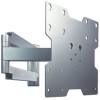Westinghouse MT80 ARM20 Installation Instructions - Page 5
Installation to Solid Concrete and Cinder Block
 |
View all Westinghouse MT80 ARM20 manuals
Add to My Manuals
Save this manual to your list of manuals |
Page 5 highlights
Installation to Solid Concrete and Cinder Block WARNING • When installing Westinghouse wall mounts on cinder block, verify that you have a minimum of 1-3/8" of actual concrete thickness in the hole to be used for the concrete anchors. Do not drill into mortar joints! Be sure to mount in a solid part of the block, generally 1" minimum from the side of the block. Cinder block must meet ASTM C-90 specifications. It is suggested that a standard electric drill on slow setting is used to drill the hole instead of a hammer drill to avoid breaking out the back of the hole when entering a void or cavity. • Concrete must be 2000 psi density minimum. Lighter density concrete may not hold concrete anchor. • Make sure that the supporting surface will safely support the combined load of the equipment and all attached hardware and components. 1 Remove cord covers from wall arm assembly (A) as shown in figure 1.1. Level and use wall plate as template to mark center of holes. Drill two 1/4" (6 mm) dia. hole to a minimum depth of 2" (51 mm). Insert anchors (B) in holes flush with wall as shown in fig 1.3. Place wall mount (A) over anchor and secure with wood screw (H) as shown in figures 1.4 and 1.6. Make sure wall mount is level, and tighten all fasteners. See figure 1.5. Skip to step 2 on next page. WARNING Drill holes and insert anchors. fig. 1.3 Place wall plate over anchor and secure with screw. fig. 1.4 concrete wall B WALL PLATE H B • Tighten screws so that wall plate is firmly attached, but do not overtighten. Overtightening can damage the screws, greatly reducing their holding power. • Never tighten in excess of 80 in. • lb (9 N.M.). Tighten all fasteners. fig. 1.5 WARNING • Concrete anchors are not intended for attachment to concrete wall covered with a layer of plaster, drywall, or other finishing material as shown below. If mounting to concrete wall covered with plaster/drywall is unavoidable, plaster/drywall (up to 5/8" thick) must be counterbored as shown below. Be sure concrete anchors do not pull away from concrete when tightening screws. If plaster/drywall is thicker than 5/8", custom fasteners must be supplied by installer. CORRECT A INCORRECT A plaster/ concrete dry wall plaster/ dry wall concrete AH B WALL PLATE fig. 1.6 CUTAWAY VIEW 5 of 10 ISSUED: 01-17-06 SHEET #: 202-9094-1













